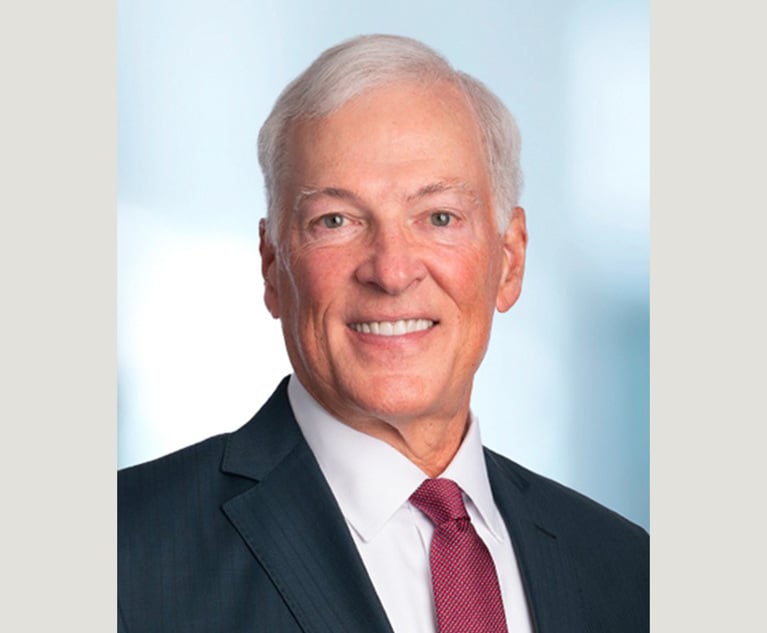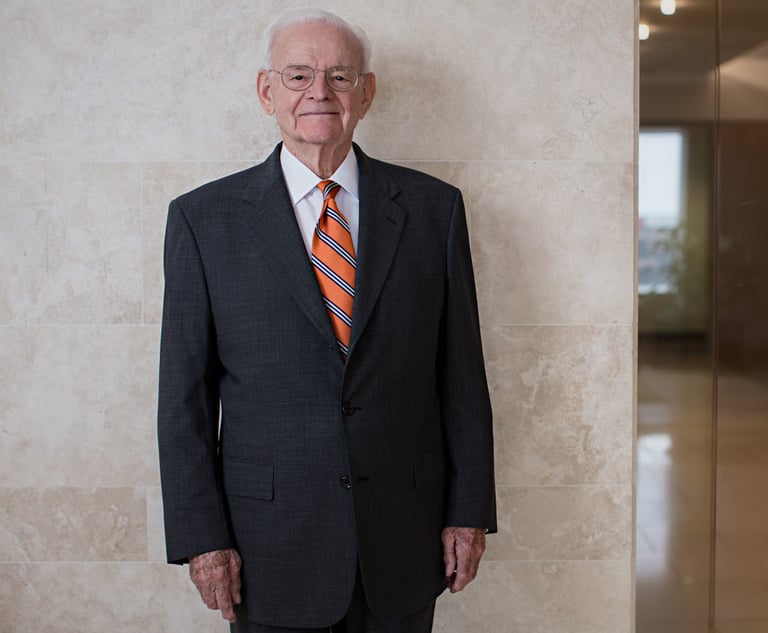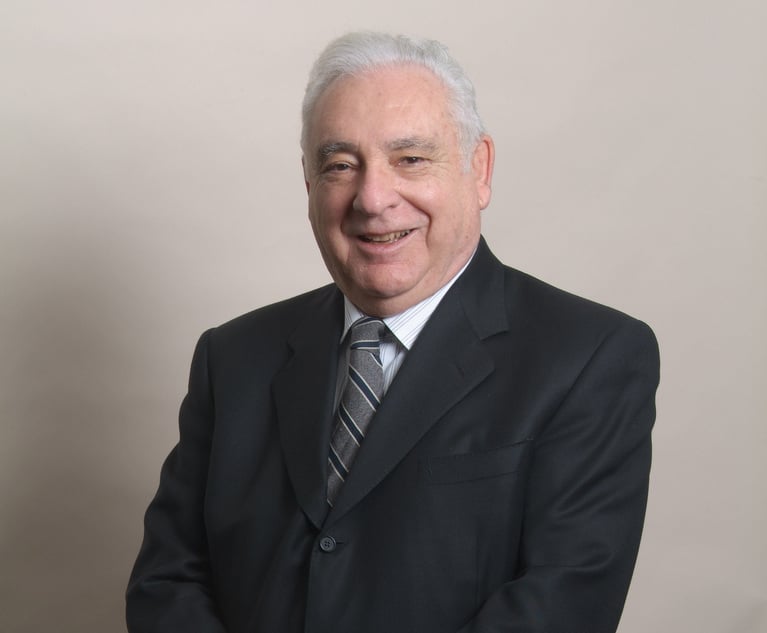 Philadelphia Court of Common Pleas Judge Timika Lane. Courtesy photo.
Philadelphia Court of Common Pleas Judge Timika Lane. Courtesy photo. Better Know Your Judges: Philadelphia Judge Timika Lane
The Legal spoke with Lane about the importance of being prepared in her courtroom, the benefits of calendaring and why the evolution of technology is so important for the legal world.
October 14, 2022 at 11:37 AM
6 minute read
This is the third installment of The Legal Intelligencer's "Better Know Your Judges" series, which features Q&A-style interviews with Pennsylvania judges focusing on their background, judicial philosophies and courtroom practices.
On the bench for nearly a decade, Philadelphia Court of Common Pleas Judge Timika Lane has had a wide breadth of legal experience both on and off the bench.
The Legal spoke with Lane about the importance of being prepared in her courtroom, the benefits of calendaring and why the evolution of technology is so important for the legal world.
Editor's note: The following was conducted via email and lightly edited for style.
TLI: How long have you been a judge?
Lane: I was first elected in 2013 and took the oath of office in January of 2014.
TLI: How long were you a practicing attorney before becoming a judge, and was there a specific area of law that you focused on?
Lane: I had been practicing for more than a decade by the time I took the bench. I had the good fortune to practice diverse areas of law before my election. As a former public defender, civil arbitrator, child advocate and chief counsel, my diverse experience helped me tremendously on the bench.
TLI: If there's one thing you would like the lawyers appearing before you to know about you what would it be?
Lane: It is extremely important that an attorney be prepared when they appear before me. As a former advocate, I expect the attorneys before me to provide effective representation to their client, and to conduct themselves with a high degree of professionalism.
TLI: What can a lawyer do to show you they are well-prepared?
Lane: In order for lawyers to show that they are well-prepared, I expect that they will be punctual and bring documentation to support their arguments.
TLI: Are there certain activities, or types of behavior you don't like to see from litigators appearing before you? If so, what are those?
Lane: I expect litigators to be courteous and professional at all times. Any type of disrespect toward or attempts to intimidate any party or court staff is intolerable.
TLI: What division do you sit in, and what types of cases do you handle?
Lane: Initially, I was assigned to the Felony-Waiver program. In that role, I adjudicated less serious felony criminal matters and criminal appeals from the Philadelphia Municipal Court. Five months later, I was assigned to the Major Trials program. I handled serious felony criminal matters including, but not limited to, human trafficking, family violence, sexual assaults, attempted murder, serious robberies and burglaries. These matters came before me as bench and jury trials. I also handled investigative grand jury matters. Currently, I am assigned to the Civil Trial Division of the court. I handle various civil motions and jury/bench trials.
TLI: What is your process for staying on top of your workload of cases and assignments?
Lane: I am a huge proponent of calendaring. I expect the attorneys and litigants who appear before me to adhere to deadlines and be prepared at each listing of a matter to insure the expedient resolution of cases. I think if individuals are made aware of your expectations beforehand, it helps prevent delays that clog up the judicial system.
TLI: The use of Advanced Communication Technology (ACT), such as Zoom and other video conferencing platforms, in the court was a major change for the legal world during the pandemic. As the legal community continues its discussion about which pandemic era changes they would like to keep, what are your thoughts in general on the use of ACT in the courtroom?
Lane: ACT was an invaluable tool during the pandemic, without which it would have been virtually impossible to administer justice in any fashion in our various court divisions. It is important that as the world around us evolves that our systems continue to evolve with it.
TLI: Would you like to see ACT be permanently adopted?
Lane: I would.
TLI: Is there a judicial philosophy, or methodology that you rely on for handling cases? If so, what is that philosophy, or methodology?
Lane: My top priority is to provide a fair and balanced approach to the law. I think it is imperative that every person that appears before the court be treated with dignity and respect. Litigants are not just names on a pleading, they are members of our community, and they deserve judges who have the experience and the knowledge to properly apply the facts of their cases to the law of the land. In every matter that appears before the Court, I strive to delve into the intricacies of each litigant's position to reach a fair outcome.
TLI: What do you do to ensure a fair process for self-represented litigants?
Lane: I understand that litigants are keenly invested in their own matters when they are not represented by counsel. In those instances, emotions tend to run a little deeper, and so I always create an environment where everyone understands that civility and mutual respect is paramount.
TLI: As settlements are an integral part of the judicial process, what techniques have you found to be most effective for settling cases before trial?
Lane: By allowing the parties the freedom to express their differing viewpoints in an environment where a certain level of decorum is expected, I have been able to facilitate open and fruitful settlement discussions.
TLI: From what you can tell, have juror attitudes changed since the pandemic? If so, how?
Lane: Initially, when we welcomed jurors back into our courtroom, there was some apprehension from individuals who were concerned about the transmission rate. However, in general, I do not feel as though the attitudes of jurors has changed since the pandemic. Most people who are selected are excited to serve and are diligent in carrying out their responsibilities.
TLI: What do you see as the biggest challenge courts in Pennsylvania currently face?
Lane: I think the greatest challenge facing the legal profession is keeping up with changes in technology and its effect on traditional methods of litigation. More than ever, it is incumbent upon litigants, counsel and the courts to evolve in the manner in which technology is used and do so in a secure fashion to protect the rights of everyone involved.
TLI: Is there anything else you would like to mention about being a judge in Philadelphia?
Lane: While being a judge in the city of Philadelphia is a huge responsibility, it has been one of the greatest joys of my life. Judges play an integral role in the everyday lives of the people who appear before them. I am dedicated to ensuring that the court is an institution that can be trusted and is accessible to everyone.
NOT FOR REPRINT
© 2025 ALM Global, LLC, All Rights Reserved. Request academic re-use from www.copyright.com. All other uses, submit a request to [email protected]. For more information visit Asset & Logo Licensing.
You Might Like
View All
Saxton & Stump Lands Newly Retired Ex-Chief Judge From Middle District of Pa.
3 minute read
'Discordant Dots': Why Phila. Zantac Judge Rejected Bid for His Recusal
3 minute read
Judge Louis C. Bechtle: An American Jurist Who Relied on Common Sense, Sound Judgment and Fairness
5 minute read
Samuel M. Lehrer, Retired Philadelphia Court of Common Pleas Judge, Dies
1 minute readTrending Stories
Who Got The Work
J. Brugh Lower of Gibbons has entered an appearance for industrial equipment supplier Devco Corporation in a pending trademark infringement lawsuit. The suit, accusing the defendant of selling knock-off Graco products, was filed Dec. 18 in New Jersey District Court by Rivkin Radler on behalf of Graco Inc. and Graco Minnesota. The case, assigned to U.S. District Judge Zahid N. Quraishi, is 3:24-cv-11294, Graco Inc. et al v. Devco Corporation.
Who Got The Work
Rebecca Maller-Stein and Kent A. Yalowitz of Arnold & Porter Kaye Scholer have entered their appearances for Hanaco Venture Capital and its executives, Lior Prosor and David Frankel, in a pending securities lawsuit. The action, filed on Dec. 24 in New York Southern District Court by Zell, Aron & Co. on behalf of Goldeneye Advisors, accuses the defendants of negligently and fraudulently managing the plaintiff's $1 million investment. The case, assigned to U.S. District Judge Vernon S. Broderick, is 1:24-cv-09918, Goldeneye Advisors, LLC v. Hanaco Venture Capital, Ltd. et al.
Who Got The Work
Attorneys from A&O Shearman has stepped in as defense counsel for Toronto-Dominion Bank and other defendants in a pending securities class action. The suit, filed Dec. 11 in New York Southern District Court by Bleichmar Fonti & Auld, accuses the defendants of concealing the bank's 'pervasive' deficiencies in regards to its compliance with the Bank Secrecy Act and the quality of its anti-money laundering controls. The case, assigned to U.S. District Judge Arun Subramanian, is 1:24-cv-09445, Gonzalez v. The Toronto-Dominion Bank et al.
Who Got The Work
Crown Castle International, a Pennsylvania company providing shared communications infrastructure, has turned to Luke D. Wolf of Gordon Rees Scully Mansukhani to fend off a pending breach-of-contract lawsuit. The court action, filed Nov. 25 in Michigan Eastern District Court by Hooper Hathaway PC on behalf of The Town Residences LLC, accuses Crown Castle of failing to transfer approximately $30,000 in utility payments from T-Mobile in breach of a roof-top lease and assignment agreement. The case, assigned to U.S. District Judge Susan K. Declercq, is 2:24-cv-13131, The Town Residences LLC v. T-Mobile US, Inc. et al.
Who Got The Work
Wilfred P. Coronato and Daniel M. Schwartz of McCarter & English have stepped in as defense counsel to Electrolux Home Products Inc. in a pending product liability lawsuit. The court action, filed Nov. 26 in New York Eastern District Court by Poulos Lopiccolo PC and Nagel Rice LLP on behalf of David Stern, alleges that the defendant's refrigerators’ drawers and shelving repeatedly break and fall apart within months after purchase. The case, assigned to U.S. District Judge Joan M. Azrack, is 2:24-cv-08204, Stern v. Electrolux Home Products, Inc.
Featured Firms
Law Offices of Gary Martin Hays & Associates, P.C.
(470) 294-1674
Law Offices of Mark E. Salomone
(857) 444-6468
Smith & Hassler
(713) 739-1250





